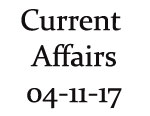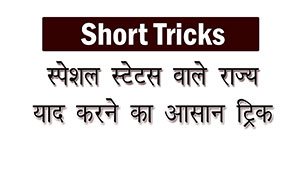-
Current Affairs 4th November 2017
Updated : 04-Nov-2017
Current Affairs 4th November 2017 - Important Points
- Specify deadlines for Aadhaar Linking , asked by - Supreme Court to mobile service providers and banks
-
Krishna Sobti chosen for prestigious Jnanpith award 2017 on - 3rd November 2017
Current Affairs 4th November 2017 - Details
Specify deadlines for Aadhaar Linking , asked by - Supreme Court to mobile service providers and banks
The Supreme Court on 3rd November 2017 directed mobile service providers and banks to define the last dates for linking mobile numbers and bank accounts to Aadhaar card via SMS and e-mails to their millions of users. The decision was given by a bench of Justices AK Sikri and Ashok Bhushan. The final date of linking mobile numbers with Aadhaar is 6th February 2018 and for linking Aadhaar with bank accounts is 31st December 2017.
However, the Union government has already applied for an affidavit in the Supreme Court to extend the Aadhaar-bank account linking time limit to 31st March 2018.
The Bench also clarified that the case questioning the validity of Aadhaar is planned to be heard in last week of November 2017. However, petitioners are free to take an extension in the linking of bank accounts with their Aadhaar, if the hearing of the case is postponed.Important Highlights
- The Rule 2(b) of the Prevention of Money Laundering (Maintenance of Records) Second Amendment Rules, 2017 needs Aadhaar for opening new bank accounts and for verification of existing bank accounts by December 31st, 2017, faulting which the bank accounts will terminate to be operational.
- However, the petitioners questioning the Aadhaar scheme testify that the important requirement of Aadhaar for public welfare schemes compress rights and freedoms which a citizen has long been enjoying. The petitions have entitled the Aadhaar Act, 2016 as unconstitutional.
Krishna Sobti chosen for prestigious Jnanpith award 2017 on - 3rd November 2017
Krishna Sobti, well known Hindi litterateur, will be honored with the 53 Jnanpith Award for the year 2017. The decision was declared by the Jnanpith Selection Board at a meeting of the selection committee held on 3rd November 2017. The meeting was headed by renowned Hindi critic Namwar Singh.
The 92-year-old writer was selected for the renowned award for her path-breaking contribution in the field of literature. The judges for the selection of the award comprised Girishwar Mishra, Shamim Hanifi, Harish Trivedi, Ramakant Rath and the director of the Bharatiya Jnanpith Leela Dhar Mandloi.
More about Krishna Sobti- Sobti was born in year 1925 in Gujrat, in Pakistan’s Punjab areas.
- She is known for experimenting with new forms of writing and creating ‘bold’ and ‘daring’ characters into her stories that were ready to accept all challenges.
- Her writing was influenced by the intermingling of Hindi, Urdu and Punjabi cultures.
- Her choice of subjects was from the Partition and relationships between male and female, to the changing dynamics of the Indian society and the gradual decrease of human values.
- Some of her popular works are Daar se Bichhudi, Dil-o-Danish, Badalom ke Ghere, Yaaron Ke Yaar, Mitron Marjani, and Zindaginama.
- She is mostly known for her novel Mitro Marajani in 1966, an unapologetic portrayal of a married woman's sexuality.
- Many of her works have been translated into English and other Indian languages and also in various foreign languages such as Swedish and Russian.
Awards & Honour - Sobti has received of many precious awards in the past including the Sahitya Akademi Award, Katha Chudamani Award, Shiromani Award and Hindi Academy Award.
- She was also aarded with the Sahitya Akademi Fellowship- the highest honor of the Akademi- in 1996.
- She was also awarded the Padma Bhushan by the Government of India in 2010, which she declined.
More about Jnanpith Award - The award is the highest literary award of the Nation which was established in 1961.
- The award is bestowed only on Indian writers in any of the 22 Indian languages included in the Eighth Schedule to the Constitution of India and English.
- It is given every year by the Bharatiya Jnanpith trust to an author for their "prestigious contribution towards literature". It is not conferred posthumously.
- Earlier to 1982, the award was only conferred for a single work by a writer; however, after 1982 the award recognized writers’ lifetime contribution to Indian literature.
- The 1st recipient of the award was the Malayalam writer G. Sankara Kurup, who gained it in 1965 for his collection of poems, Odakkuzhal.
- Bengali writer, Ashapoorna Devi was the 1st woman novelist to win the award in year 1976 for her 1965 novel Pratham Pratisruti.
- In year 2016 alsol, the award went to a woman novelist - Bengali poet and critic Shankha Ghosh.














